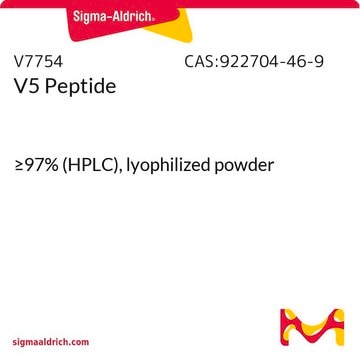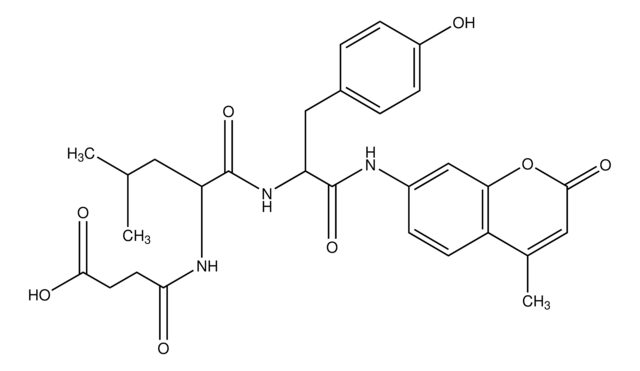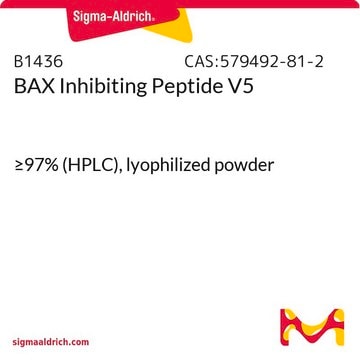All Photos(1)
About This Item
Empirical Formula (Hill Notation):
C142H230N36O44S1
Molecular Weight:
3177.63
UNSPSC Code:
12352202
NACRES:
NA.32
Recommended Products
product name
Calpastatin Peptide Ac 184-210, ≥95% (HPLC)
Assay
≥95% (HPLC)
form
lyophilized
composition
Peptide Content, ≥75%
storage condition
protect from light
storage temp.
−20°C
Amino Acid Sequence
Ac-Asp-Pro-Met-Ser-Ser-Thr-Tyr-Ile-Glu-Glu-Leu-Gly-Lys-Arg-Glu-Val-Thr-Ile-Pro-Pro-Lys-Tyr-Arg-Glu-Leu-Leu-Ala-NH2
Application
Calpastatin Peptide Ac 184-210 has been used as the endogenous calpain inhibitor to study its effects on myristoylated alanine-rich C kinase substrate (MARCKS) cleavage in mouse kidney cells. It has also been used as a calpain inhibitor to examine its effects on the formation of DNA-platinum adducts by cisplatin (CDDP) in neuronal cells.
Biochem/physiol Actions
Calpastatin, a component of the calpain/calpastatin system, is a calpain (calcium-dependent cysteine protease) inhibitor. The calpain/calpastatin system is involved in numerous membrane fusion events, such as neural vesicle exocytosis and platelet and red-cell aggregation.
Calpastatin, located in the cytosol, is involved in selective protein cleavage in response to calcium signaling.
Storage Class Code
11 - Combustible Solids
WGK
WGK 3
Flash Point(F)
Not applicable
Flash Point(C)
Not applicable
Certificates of Analysis (COA)
Search for Certificates of Analysis (COA) by entering the products Lot/Batch Number. Lot and Batch Numbers can be found on a product’s label following the words ‘Lot’ or ‘Batch’.
Already Own This Product?
Find documentation for the products that you have recently purchased in the Document Library.
Calpain in the cleavage of alpha-synuclein and the pathogenesis of Parkinson's disease
Shams R, et al.
Progress in Molecular Biology and Translational Science, 167, 107-124 (2019)
Aysel Cetinkaya-Fisgin et al.
Scientific reports, 10(1), 21889-21889 (2020-12-16)
Cisplatin is a commonly used chemotherapy agent with significant dose-limiting neurotoxicity resulting in peripheral neuropathy. Although it is postulated that formation of DNA-platinum adducts is responsible for both its cytotoxicity in cancer cells and side effects in neurons, downstream mechanisms
Darrice S Montgomery et al.
American journal of physiology. Cell physiology, 313(1), C42-C53 (2017-05-05)
We previously demonstrated a role for the myristoylated alanine-rich C kinase substrate (MARCKS) to serve as an adaptor protein in the anionic phospholipid phosphate-dependent regulation of the epithelial sodium channel (ENaC). Both MARCKS and ENaC are regulated by proteolysis. Calpains
Our team of scientists has experience in all areas of research including Life Science, Material Science, Chemical Synthesis, Chromatography, Analytical and many others.
Contact Technical Service







